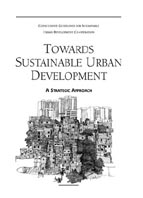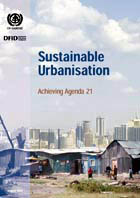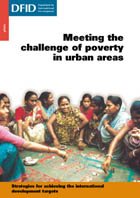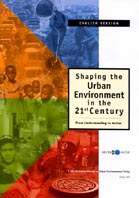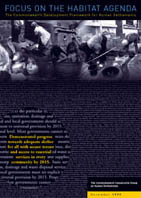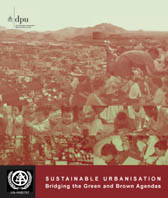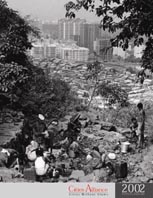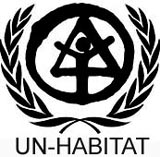INSTITUTIONAL PUBLICATIONSThis section refers to policy frameworks, guidelines and other types of official material from international and government agencies such as UN-Habitat or DFID.
|
|
Consultative
Guidelines for Sustainable Urban Development Co-operation. Towards
Sustainable Urban Development: a Strategic Approach The central objective of the European Community's development co-operation policy is poverty reduction and ultimately its eradication, through sustainable development and the progressive integration of Third World countries into the global economy. In this context, a co-operation framework needs to be tailored to the individual circumstances of each country. This can be achieved by identifying strategies that provide links, in practical ways, with how development programmes are formulated and run. There is also a need to promote local ownership and social reform, the integration of the private sector and civil society into the urban development process. These are the main objectives of sustainable urban development. These Guidelines for the European Union's Sustainable Urban Development Co-operation represent and important step in efforts to improve conditions in towns and cities. European Union partners in Third World countries confront these issues critically. |
|
|
|
The Guidelines have been developed in consultation with the Expert Group on Urban Development from Member States and the Urban Development Reference Group of the European Commission. They give emphasis to the need for responsive, participatory and transparent urban governance and effective and efficient urban management. The Guidelines provide practical advice to practitioners involved in the process of urban development, within third World countries. Practitioners include professional staff of the European Commission headquarters and delegations and their consultants, as well as staff of partner country organisations. The basic objectives of the Guidelines are to provide a framework for effective support for urban development and to create sectoral projects in urban areas to improve their overall performance and impact. The guidelines demonstrate that investment of co-operation funds in urban development can contribute effectively to both, urban and national development. Similarly, co-operation in sectoral projects, such as transport, water and sanitation, within towns and cities can have a greater impact on a wider scale than just one of the sectors. Moreover, by following the guidelines for the formulation and appraisal of urban and sectoral projects, implementation, monitoring and evaluation become easier to undertake. |
||
|
Sustainable Urbanisation: Achieving Agenda 21 UN-HABITAT & DFID (2002) Sustainable urbanisation is a dynamic multi-dimensional process covering environmental as well as social, economic and political-institutional sustainability. It embraces relationships between all human settlements, from small urban centres to metropolises, and between towns and cities and their surrounding rural areas. In this document, the main challenges to achieving sustainable urbanisation are identified and recent experiences of promising approaches to planning and managing urban areas reviewed. These demonstrate a range of ways in which urbanisation can contribute to sustainable development. |
|
|
Meeting the challenge of poverty in urban areas: Strategies for achieving the international development targets DFID Strategy Paper (2001) This paper sets out the central role that well-governed and managed cities and towns can play in reducing poverty. The key message is that achievement of the International Development Targets will depend in part on the development of strategies which recognise the important role played by cities and towns in strengthening poor people's capacity to improve their socio-economic and political conditions. It underlies the need to address the particular characteristics of urban poverty which can constrain these opportunities. |
||
|
The Strategy Paper's key messages are:
In support of the international development targets DFID endorses the UN Secretary General's Millennium Declaration includes a specific target dealing with urban poverty: by 2020, to have achieved a significant improvement in the lives of at least 100 million slum dwellers as proposed by the Cities Without Slums initiative. DFID supports the efforts of countries to implement the Habitat Agenda, agreed at Istanbul in June 1996. The Commonwealth Consultative Group on Human Settlements has agreed that they will aim for demonstrated progress towards adequate shelter for all with secure tenure and access to essential services in every community by 2015. The overall challenges are:
|
||
|
Shaping the Urban Environment in the 21st Century: From Understanding to Action This reference manual highlights the potential contribution of sound urban-environment management to borth environmental and development goals, or in the words of the Brundtland Commission, to development that "meets the needs of the present without compromising the ability of future generations to meet their own needs". It suggests that improving environmental management can contribute directly to better living conditions, notably for the poorest, while stimulating balanced socio-economic development in urban centres, peri-urban areas and surrounding regions. The manual aims to not only to provide advice for development co-operation agencies and their counterparts in partners' countries in their efforts to address urban environmental problems, it also highlights the environmental roles and responsibilities of many other actors. Good governance lies at the centre of more effective responses to urban environmental problems, city and municipal authorities, citizens and their community-based organisations, the private sector and NGOs have key roles too. |
|
|
|
Shaping the 21st Century: The Contribution of Development Co-operation Shaping the 21st Century was adopted by the DAC Member Development Ministers and Heads of Aid Agencies at their meeting of 6-7 May 1996. It sets forth strategic orientations for development co-operation into the21st Century. The report recalls the importance of development for people everywhere and the impressive record of human progress during the past 50 years. It suggests a set of basic goals as a vision for the future, and proposes strategies for attaining that vision through partnerships in support of self-help efforts, improved co-ordination and consistent policies. For more information: www1.oecd.org/dac/urbenv/ |
||
|
Focus
on the Habitat Agenda: The Commonwealth Development Framework for
Human Settlements Prepared by the Commonwealth Human Ecology Council (CHEC) with the support of the International Institute of Environment and Development and Environ (Trust) and UK Department for International Development (DFID), this document draws on the experience of member states, to clarify specific development goals included in the Habitat Agenda and to explore practical responses to these challenges within Commonwealth member countries. These goals, enriched by Commonwealth contributions towards their achievement, have been encapsulated in this Commonwealth Development Framework for Human Settlements as signposts to success.
|
|
|
|
At an historic meeting held in Nairobi in May 1999, the Commonwealth Secretariat in partnership with the Commonwealth Human Ecology Council (CHEC) instigated an innovative approach to implementing the Habitat Agenda by setting up the Commonwealth Consultative Group on Human Settlements (CCGHS). The CCGHS will work through practical, hands-on approaches to providing shelter and improving human settlements by:
Link to the Commonwealth Consultative Group on the Environment (CCGE) |
||
|
Localising
the Habitat Agenda for Urban Poverty Reduction 'Localising the Habitat Agenda for Urban Poverty Reduction' is a major 3-year research programme funded by the UK Government's Department for International Development, under the Urbanisation Knowledge and Research theme. It is lead by a team at the Max Lock Centre at the University of Westminster in London, in partnership with the Water, Engineering and Development Centre, University of Loughborough and other partners in London, Nairobi, Delhi and Recife. The document addresses urban poverty in the context of the Habitat Agenda with a focus on sharing the experience of practice and policies. The research aims to facilitate the implementation of the Habitat Agenda, through a published toolkit of guidelines/ indicators to aid pro-poor development practice at the local level. This research project builds on the efforts that went into the recent five-year appraisal by asking, ‘can the Habitat Agenda, as the internationally agreed policy framework for human settlements, usefully serve the purpose of urban poverty reduction?’. |
|
|
|
In doing so it aims to facilitate the improved implementation of the Habitat Agenda. The outputs of this paper include policy recommendations and a toolkit of guidelines, indicators and good practice case studies and methodologies directed at governments, local governments and other Habitat Agenda partners. The research also aims to inform various UN Human Settlements Programme activities. In particular, the work of the new Urban Forum that incorporates the International Forum on Urban Poverty; the Global Campaign for Urban Governance; the Best Practice and Local Leadership Programme; and the Global Urban Observatory and Urban Indicators Programme. These initiatives have an important role in supporting local efforts to implement the Habitat Agenda. Localising the Habitat Agenda for Urban Poverty Reduction is a 4-year research programme funded by the UK Government's Department for International Development, under the Urbanisation Knowledge and Research theme. It is led by a team at the Max Lock Centre at the University of Westminster in London, in partnership with UN-Habitat, the World Association of Cities and Local Authorities Co-ordination, the Water, Engineering and Development Centre, University of Loughborough and partners in London, Nairobi, Delhi, Karachi and Recife. for more information: www.citypoverty.net/ |
||
|
Sustainable Urbanisation: Bridging the Green and Brown Agenda Directed & written by Adriana Allen & Nicholas You, published by The Development Planning Unit (2002) The World Summit on Sustainable Development (WSSD) constitutes a milestone to assess progress in response toAgenda 21. Over the last decade, this Agenda has inspired innumerable global initiatives and local innovations in the search for more sustainable forms of social, economic and environmental development. Since the adoption of the Habitat Agenda, a systematic effort has also been made to document these initiatives and innovations, providing a wealth of knowledge, experience and lessonsfor further reflection, action and consolidation. This book examines some of these lessons and their institutional and policy implicationsin the belief that more sustainable forms of development will increasingly depend on creating strong links between local initiatives and national and international responses. Prefaced by Anna Kajumulo Tibaijuka, Executive Director UN-Habitat, this book is a companion of Implementing the Habitat Agenda: In Search of Urban Sustainability, also jointly produced by the Development Planning Unit (DPU) University College London and the United Nations Human Settlements Programme (UN-Habitat) with financial support from the Infrastructure and Urban Development Department (IUDD) of the UK Department for International Development (DFID). |
||
|
Like its companion, this book is intended for decision-makers at all levels, community leaders and women and men concerned with and engaged inenvironmental and development issues, be it in preserving the global commonsor in improving the local living environment. We hope that the ideas and case studies presented stimulate furtheraction and debate for a sustainable and urbanised world. This book makes the case for sustainable urbanisation by bridging the Green and Brown Agendas. It advocates that in a rapidly urbanising world, the quest for more sustainable development will increasingly depend on how well we manage and govern cities. It shows, through the analysis of more than 70 case studies, that these approaches are already being implemented throughout the world. It argues, however, that the impact of many of these experiences have been confined to the place and society where they took place, yet they all offer lessons that could be transferred to others. Towards the end, the book presents a set of interlinked approaches to scaling up sustainable urbanisation strategies to a global level. For more information on the publication published by the Development Planning Unit (DPU): www.ucl.ac.uk/dpu/rio10.htm |
||
|
Cities Alliance 2002 Annual Report 2002 Report of Cities Alliance, a global alliance of cities and their development partners committed to improve the living conditions of the urban poor through action. The report highlights how Cities Alliance aims to foster new tools, practical approaches and knowledge sharing to promote local economic development and a direct attack on urban poverty. Its activities support the implementation of the Habitat Agenda. |
|
